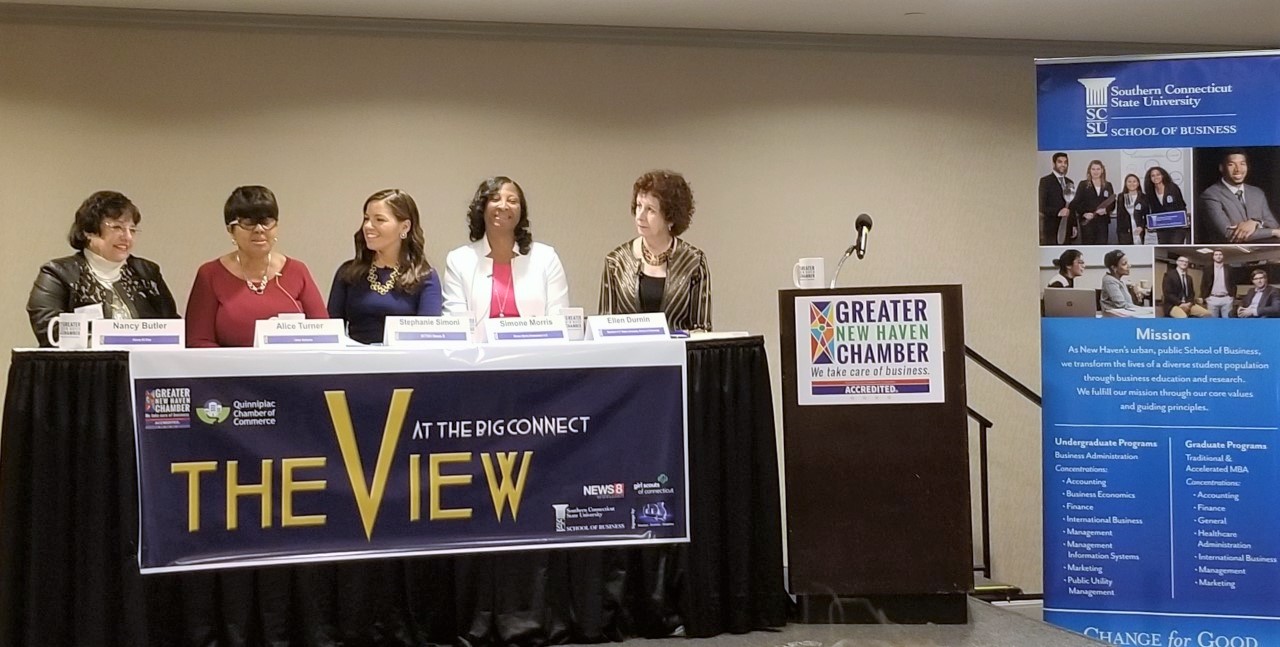Dr. Ellen Durnin, dean of Southern’s School of Business, joined three other powerhouse women and moderator Stephanie Simoni of WTNH-TV in a discussion on “Navigating Strategic Partnerships,” part of the Greater New Haven Chamber of Commerce’s annual Big Connect business exposition on November 21 at the Omni New Haven Hotel at Yale.
The panel discussion, modeled after the daytime talk show The View, tackled overcoming personal and professional setbacks, carving out paths that are both rewarding and well-paying, and managing societal expectations that predominantly impact women.
When Durnin first went to college, she said, she chose the traditionally female career path of elementary education. She pointed out that everyone gets a wake-up call in life at some point, and she is grateful hers came early in her career, when, after spending time in an elementary school, she realized that was not the right choice for her. She went back to school and earned her master’s degree in labor relations and later her Ph.D. in business. She started her career in union organizing, and there she learned valuable lessons about conflict resolution and negotiations.
Another panelist, Nancy Butler’s, career was jump-started when she was newly divorced with small children and no high school diploma. She built an asset management and financial planning business with not much more than grit, a willingness to learn, and the knowledge that networking was key. Butler had $200 million in assets under management before she sold her business 12 years ago.
Panelists Alice Turner and Simone Morris were both comfortable in corporate careers until they were downsized. Turner, finding herself unemployed in midlife, was terrified, but found a way to leverage what she’d learned in her corporate life to create URISE, an award-winning nonprofit with an innovative approach to education and economic development, preparing minority youth for careers in STEM fields as leaders, employees, and entrepreneurs. She is focused on bettering the educational experience for Connecticut’s urban youth, and finds immense fulfillment in her pursuits. She’s even talking about going back to school herself, embracing the fact that we are all lifelong learners.
Morris had to overcome her introverted nature to find success in her entrepreneurial career after losing her corporate IT job. She utilizes LinkedIn as a key component in her networking strategy, but admits she is most successful when she gets out from behind her computer. Morris’ current business, Simone Morris Enterprises, is her third LLC and specializes in corporate diversity and inclusion training, career workshops, and success coaching.
Butler and Morris both stress the importance of building name recognition when growing a business. Butler sent out mailings offering her services as a public speaker, and reached out to other local professionals with an offer to buy them lunch. But she cautioned, “You can’t build a business quickly by seeing one person at a time. You need to get in front of a lot of people.” Their seats on the Women’s Power Panel show these successful women are still practicing what they preach by getting in front of a crowd.
Durnin, in her role as the SCSU School of Business dean, is used to interacting with strong personalities, including faculty members and her Business Advisory Council, two groups who are valued for their strong opinions. She admits it can be difficult managing a group of people with differing priorities and opinions, but knows that by digging deeply, connections can be made. Durnin also touched on the importance of not only managing down, but managing up. She mentioned two supervisors from her past, one who wanted a high level overview of a topic, and the other who needed every detail. She says it’s critical to know what your boss needs and how they need it delivered for both your success and theirs, adding, “Managing your boss is a critical skill for navigating strategic relationships.”


